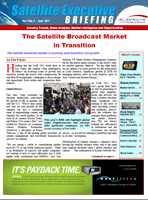Euroconsult Report Forecasts 7% Annual Increase in MSS Revenues in the Next 10 years
Paris, June 16, 2011--Euroconsult said in a new report on mobile satellite services (MSS) that continued demand in a wide range of applications and geographic markets over the coming decade will drive growth in the sector. In particular, strong demand from commercial markets will boost the industry and more than offset a potential slowdown from government users for current military operations, which accounted for much of the growth over the previous ten years.
In the report, “Mobile Satellite Communications Markets Survey, Prospects to 2020,” Euroconsult forecasts that the MSS market will grow at an annual rate of nearly 13%, from 2.4 million terminals in service in 2010 to 7.8 million by 2020. Low-data rate machine-to-machine (M2M) devices will have a significant share in this subscriber growth while their contribution to service revenues will still remain limited.
“MSS wholesale revenue is expected to grow roughly 7% per year over the coming decade, due to increased demand for broadband and other MSS services in a number of vertical segments and emerging regions,” said Wei Li, Senior Consultant at Euroconsult and principal author of the report. “Nevertheless, competition from terrestrial technologies and VSAT services will remain a major limitation for MSS growth.”
The report attributes a large part of this market growth to the continued shift from legacy voice services to data applications, in both high-speed broadband and low-speed messaging and asset tracking. Growth should also be supported by new products with enhanced capabilities, enabled in part by the launch of new MSS systems -- including Iridium NEXT and second-generation constellations from Globalstar and Orbcomm.
In 2010, MSS operators generated total consolidated revenues[1]of $1.38 billion, up 8.8% over the previous year. Of the six global MSS operators, three companies -- Inmarsat, Iridium, and Thuraya -- currently capture about 90% of the MSS market revenue. Euroconsult estimates that MSS wholesale service revenues alone will exceed $2.2 billion in 2020, with equipment revenues slightly down over the next ten years due to declining hardware prices.
Euroconsult’s report also examines the threat from mobile VSAT applications in the C- and Ku-bands as well as the impact of additional investments in Ka-band. VSAT solutions are increasingly used aboard large ships for broadband communications, in particular in maritime and aeronautical markets, because they offer higher data rates and more attractive service pricing than MSS solutions. Leading MSS operator Inmarsat has announced its plans to launch global Ka-band satellite service by 2014 (Global Xpress) to counter the current VSAT threat – potentially heating up the competitive atmosphere further if those plans come to fruition in a timely manner. This technology shift in the VSAT market should also have an impact on the MSS industry.
Despite this competitive environment, Euroconsult foresees strong growth for MSS across all segments including land, maritime and aeronautical over the next ten years. The report predicts that the aeronautical segment will be the fastest growing vertical market, with double-digit growth in revenue and a 9% increase in terminals over the coming decade. Some major international air carriers have already installed MSS terminals on board their planes for passenger use, and several other carriers are in the process of doing so or considering it. Other important user markets include merchant shipping, fishing, oil & gas, natural resources, media, and non-governmental organizations (NGOs), in addition to government/military users that today still comprise the largest MSS customer base.
The Asia Pacific and Latin American markets should emerge as growth areas over the next decade, according to the report. In the Asia Pacific region, the number of MSS terminals is estimated to grow an average of 20% annually between 2010 and 2020 and wholesale service revenues are expected to reach nearly $500 million in 2020. Latin America, while the smallest MSS market, should see improvements in service distribution and a regulatory opening of certain markets that will result in average annual growth through 2020 in the double digits for both MSS wholesale service revenue and the number of active terminals in the region. North America should remain the largest MSS market, with revenues however growing more modestly and mainly coming from new growth areas, such as M2M and the aeronautical market.
Report Profile
Mobile Satellite Communications Markets Survey, Prospects to 2020provides a complete analysis of the MSS value chain; ten-year forecasts for wholesale revenues and terminals; review of vertical markets including forecasts to 2020; and analysis of application and geographic markets. It also includes a dedicated section for the equipment manufacturing market, broader assessment of the service provision market, including quantitative forecasts and much more. The report provides the foundation for business and strategic planning and investment decisions for MSS operators, service providers, satellite and equipment manufacturers, launchers, government agencies, and investors.





